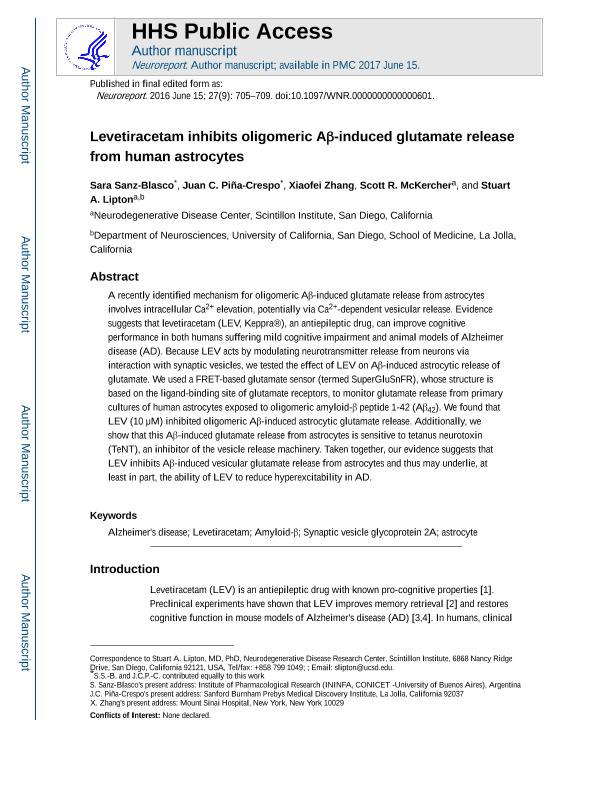Artículo
Levetiracetam inhibits oligomeric Aβ-induced glutamate release from human astrocytes
Sanz Blasco, Sara Isabel ; Piña Crespo, Juan C.; Zhang, Xiaofei; McKercher, Scott R.; Lipton, Stuart A.
; Piña Crespo, Juan C.; Zhang, Xiaofei; McKercher, Scott R.; Lipton, Stuart A.
 ; Piña Crespo, Juan C.; Zhang, Xiaofei; McKercher, Scott R.; Lipton, Stuart A.
; Piña Crespo, Juan C.; Zhang, Xiaofei; McKercher, Scott R.; Lipton, Stuart A.
Fecha de publicación:
06/2016
Editorial:
Lippincott Williams
Revista:
Neuroreport
ISSN:
0959-4965
Idioma:
Inglés
Tipo de recurso:
Artículo publicado
Clasificación temática:
Resumen
A recently identified mechanism for oligomeric Aβ-induced glutamate release from astrocytes involves intracellular Ca2+ elevation, potentially by Ca2+-dependent vesicular release. Evidence suggests that levetiracetam (LEV; Keppra), an antiepileptic drug, can improve cognitive performance in both humans with mild cognitive impairment and animal models of Alzheimer disease. Because LEV acts by modulating neurotransmitter release from neurons by interaction with synaptic vesicles, we tested the effect of LEV on Aβ-induced astrocytic release of glutamate. We used a fluorescence resonance energy transfer-based glutamate sensor (termed SuperGluSnFR), whose structure is based on the ligand-binding site of glutamate receptors, to monitor glutamate release from primary cultures of human astrocytes exposed to oligomeric amyloid-β peptide 1-42 (Aβ42). We found that LEV (10 μM) inhibited oligomeric Aβ-induced astrocytic glutamate release. In addition, we show that this Aβ-induced glutamate release from astrocytes is sensitive to tetanus neurotoxin, an inhibitor of the vesicle release machinery. Taken together, our evidence suggests that LEV inhibits Aβinduced vesicular glutamate release from astrocytes and thus may underlie, at least in part, the ability of LEV to reduce hyperexcitability in Alzheimer disease.
Archivos asociados
Licencia
Identificadores
Colecciones
Articulos(ININFA)
Articulos de INST.DE INVEST.FARMACOLOGICAS (I)
Articulos de INST.DE INVEST.FARMACOLOGICAS (I)
Citación
Sanz Blasco, Sara Isabel; Piña Crespo, Juan C.; Zhang, Xiaofei; McKercher, Scott R.; Lipton, Stuart A.; Levetiracetam inhibits oligomeric Aβ-induced glutamate release from human astrocytes; Lippincott Williams; Neuroreport; 27; 9; 6-2016; 705-709
Compartir
Altmétricas



